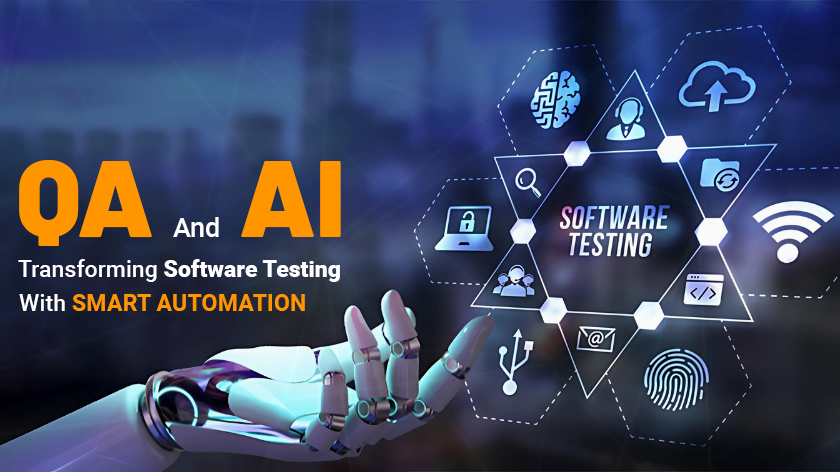Software testing is evolving rapidly with artificial intelligence (AI) integration, bringing transformative changes to the field. Traditional QA methods demand significant manual effort, increasing time and costs. AI-powered automation transforms software testing, increasing speed, efficiency, and accuracy. Businesses can streamline QA, enhance precision, and accelerate time-to-market with AI.
The Evolution of Software Testing with AI
AI has introduced a paradigm shift in QA by enabling intelligent automation. Instead of relying solely on manual testers to execute repetitive tasks, AI-driven tools can analyze test cases, predict potential failures, and enhance test coverage. This transformation leads to better software quality and accelerated delivery cycles. AI also makes testing more adaptable to evolving software environments and dynamic business needs, ensuring consistency and reliability.
Key Benefits of AI in Software Testing
- Enhanced Test Efficiency: AI reduces the time required for test execution by automating repetitive tasks, allowing testers to focus on critical problem-solving and strategic enhancements.
- Higher Accuracy: Eliminates human errors, ensuring precise test results, leading to more reliable software performance and improved user experience.
- Predictive Analysis: AI can detect potential bugs before they escalate into critical issues, enabling proactive resolution and minimizing downtime.
- Self-Healing Test Scripts: AI-powered automation adapts to UI changes, reducing script maintenance efforts and ensuring seamless testing workflows.
- Improved Test Coverage: AI enables broader test scenarios, including edge cases that manual testing might miss, leading to a more comprehensive software evaluation and robust application performance.
How AI-Powered Automation Works
1. Test Case Generation
AI analyzes application behavior and generates optimized test cases, reducing manual effort. It helps identify gaps in existing test scenarios and ensures thorough software validation, covering various functional and non-functional aspects.
2. Defect Detection & Prediction
Machine learning algorithms identify patterns in code to predict and highlight potential defects before they impact software functionality. This proactive approach prevents costly failures and enhances customer satisfaction by ensuring bug-free applications.
3. Automated Regression Testing
AI ensures that new changes do not break existing functionalities by continuously running regression tests. This process reduces risks, enhances stability, and speeds up software releases with confidence.
4. Visual Testing
AI-powered tools compare UI elements pixel by pixel, identifying visual inconsistencies that human testers might overlook. This ensures a seamless and visually appealing user experience across different devices, platforms, and screen resolutions.
Real-World Applications of AI in QA
Many industries are leveraging AI-driven testing to enhance software quality and performance:
- E-commerce: AI ensures smooth user experiences by detecting bugs in checkout and payment systems, reducing the risk of transaction failures and revenue loss.
- Healthcare: AI-driven QA verifies medical software for compliance, accuracy, and security, ensuring patient safety and regulatory adherence.
- Banking & Finance: AI enhances security by continuously testing transaction flows, fraud detection systems, and authentication mechanisms to prevent cyber threats.
- Telecom: AI optimizes network performance by automating complex testing processes, ensuring uninterrupted connectivity and efficient service delivery.
Challenges in AI-Based Testing & Solutions
1. Initial Implementation Complexity
Teams struggle to integrate AI into workflows due to a lack of expertise. Solution: Start with small AI-driven test cases before scaling up. Providing training on AI-based testing tools can help teams transition smoothly.
2. Data Dependency
AI requires vast amounts of training data for accurate results, which can be a limitation. Solution: Utilize historical testing data to train AI models effectively. Implementing data augmentation techniques can further enhance AI learning capabilities.
3. Cost of AI Tools
AI-powered automation tools can be expensive for small and mid-sized businesses.
Solution: Leverage open-source AI testing frameworks to minimize costs. Gradually investing in AI while assessing its return on investment can help businesses balance budget and efficiency.
Future of AI in Software Testing
As AI continues to evolve, its role in software testing will become more profound. Future trends include:
- AI-Driven Test Maintenance: Self-adapting test scripts that require minimal human intervention, significantly reducing maintenance efforts and costs.
- Hyper-Automation: The combination of AI with robotic process automation (RPA) for end-to-end testing, enhancing efficiency across the software development lifecycle.
- AI-Enhanced Security Testing: AI detects security vulnerabilities in real time, preventing potential cyber threats and ensuring robust application security.
- Natural Language Processing (NLP) in Test Creation: AI writing and executing test scripts based on human instructions, simplifying the testing process for non-technical users and accelerating development workflows.
Conclusion
AI-powered automation is revolutionizing software testing, making it more efficient, accurate, and scalable. Businesses that embrace AI in QA will experience faster releases, improved software quality, and reduced operational costs. The future of software testing is smart automation, and AI is at the forefront of this transformation. As AI advances, software testing will evolve to ensure seamless user experiences across industries.
Transform your software testing with AI-powered automation today Partner with Xceltec!
For More Information: https://www.xceltec.com/
 :
https://in.pinterest.com/xceltec0192/
:
https://in.pinterest.com/xceltec0192/












